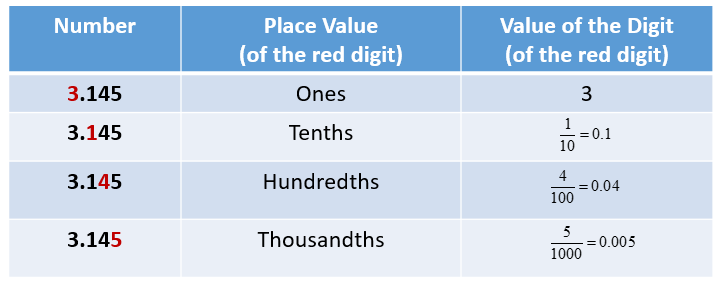Decimal Place Value & Reading Decimals
In these lessons, we will learn how to read place values and decimal numbers.
Related Pages
Place Value Chart
Adding Decimals Using Place Value
More Numbers Lessons
Reading Place Values
A decimal number is a number that has digits before and after a decimal point. The decimal point is placed after the ones digit.
Example:
Let us look at the decimal number 3.145
Each digit in a decimal number has a place value depending
on its position.
The following table shows the number 3.145 in a place value chart. Scroll down the page for more examples and solutions.

The value of a digit is determined by its place value. Give the place value and the value of the digit.

When the decimal point of a number is not shown (for example, in whole numbers), then it is assumed to be at the end of the number.
Example:
321 = 321.
4 = 4.
Reading Decimal Numbers
Example:
Read 38.7425
Solution:
Step 1: Values to the left of the decimal point are greater than one.
38 means 3 tens and 8 ones.
Step 2: The word name of the decimal is determined by the place value of the digit in the last place.
The last digit (5) is in the ten-thousandth place.
38.7425 is read as thirty-eight and seven thousand four hundred twenty-five ten thousandths.
How To Read A Decimal?
In this video, you will learn decimal place value patterns for tenths, hundredths, and thousandths.
Real world examples help students understand everyday uses for decimals in measurement.
How To Read And Write Decimal Numbers?
Review Of How To Read And Write Decimals
Try the free Mathway calculator and
problem solver below to practice various math topics. Try the given examples, or type in your own
problem and check your answer with the step-by-step explanations.

We welcome your feedback, comments and questions about this site or page. Please submit your feedback or enquiries via our Feedback page.